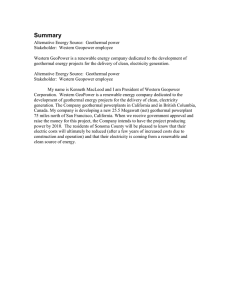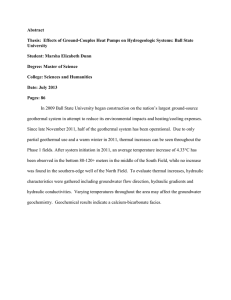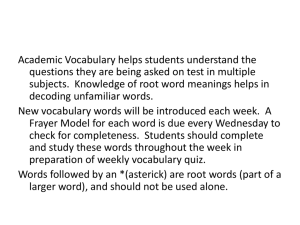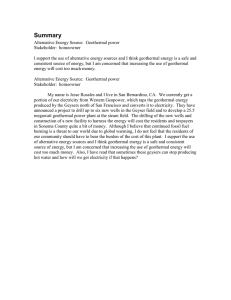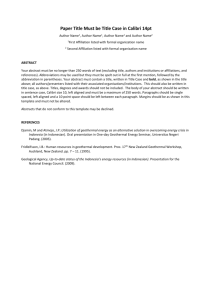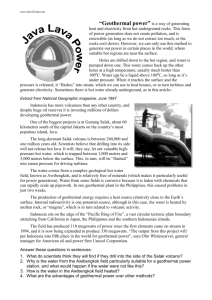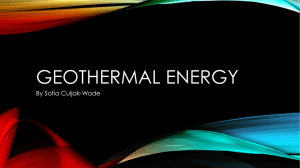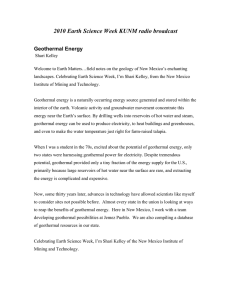Course Form
advertisement
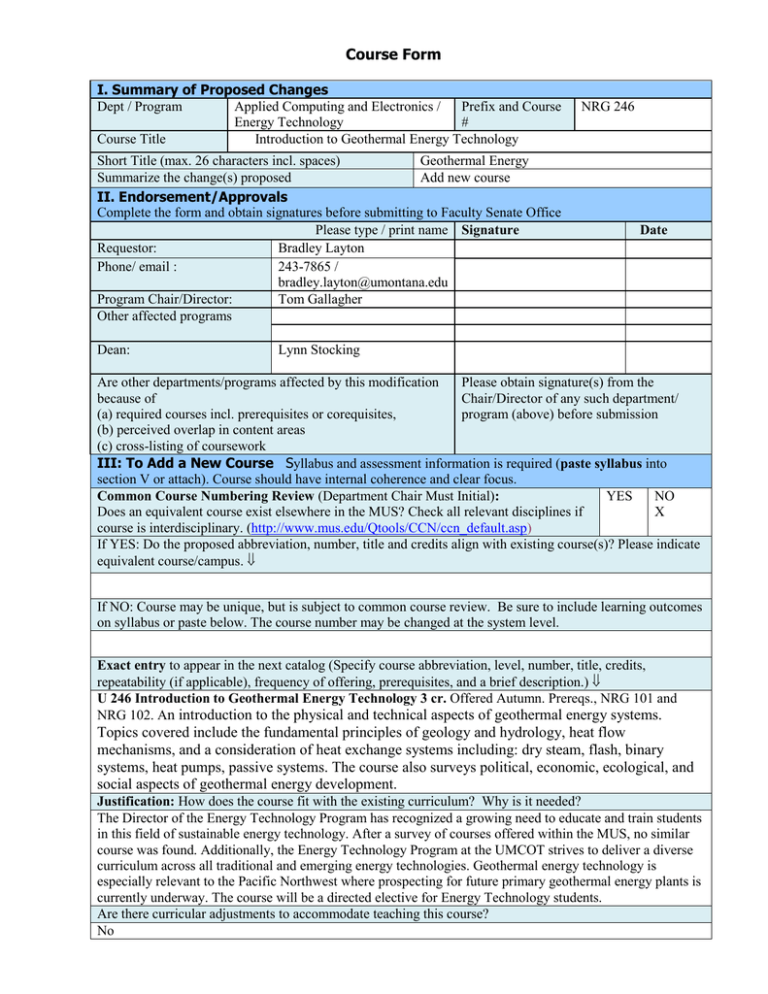
Course Form I. Summary of Proposed Changes Dept / Program Applied Computing and Electronics / Prefix and Course Energy Technology # Course Title Introduction to Geothermal Energy Technology Short Title (max. 26 characters incl. spaces) Geothermal Energy Summarize the change(s) proposed Add new course II. Endorsement/Approvals Complete the form and obtain signatures before submitting to Faculty Senate Office Please type / print name Signature Requestor: Bradley Layton Phone/ email : 243-7865 / bradley.layton@umontana.edu Program Chair/Director: Tom Gallagher Other affected programs Dean: NRG 246 Date Lynn Stocking Are other departments/programs affected by this modification Please obtain signature(s) from the because of Chair/Director of any such department/ (a) required courses incl. prerequisites or corequisites, program (above) before submission (b) perceived overlap in content areas (c) cross-listing of coursework III: To Add a New Course Syllabus and assessment information is required (paste syllabus into section V or attach). Course should have internal coherence and clear focus. Common Course Numbering Review (Department Chair Must Initial): YES NO Does an equivalent course exist elsewhere in the MUS? Check all relevant disciplines if X course is interdisciplinary. (http://www.mus.edu/Qtools/CCN/ccn_default.asp) If YES: Do the proposed abbreviation, number, title and credits align with existing course(s)? Please indicate equivalent course/campus. If NO: Course may be unique, but is subject to common course review. Be sure to include learning outcomes on syllabus or paste below. The course number may be changed at the system level. Exact entry to appear in the next catalog (Specify course abbreviation, level, number, title, credits, repeatability (if applicable), frequency of offering, prerequisites, and a brief description.) U 246 Introduction to Geothermal Energy Technology 3 cr. Offered Autumn. Prereqs., NRG 101 and NRG 102. An introduction to the physical and technical aspects of geothermal energy systems. Topics covered include the fundamental principles of geology and hydrology, heat flow mechanisms, and a consideration of heat exchange systems including: dry steam, flash, binary systems, heat pumps, passive systems. The course also surveys political, economic, ecological, and social aspects of geothermal energy development. Justification: How does the course fit with the existing curriculum? Why is it needed? The Director of the Energy Technology Program has recognized a growing need to educate and train students in this field of sustainable energy technology. After a survey of courses offered within the MUS, no similar course was found. Additionally, the Energy Technology Program at the UMCOT strives to deliver a diverse curriculum across all traditional and emerging energy technologies. Geothermal energy technology is especially relevant to the Pacific Northwest where prospecting for future primary geothermal energy plants is currently underway. The course will be a directed elective for Energy Technology students. Are there curricular adjustments to accommodate teaching this course? No Complete for UG courses (UG courses should be assigned a 400 number). Describe graduate increment - see procedure 301.30 http://umt.edu/facultysenate/committees/grad_council/procedures/default.aspx Complete for Co-convented courses Companion course number, title, and description (include syllabus of companion course in section V) See procedure 301.20 http://umt.edu/facultysenate/committees/grad_council/procedures/default.aspx. N/A New fees and changes to existing fees are only approved once each biennium by the YES NO Board of Regents. The coordination of fee submission is administered by Administration X and Finance. Fees may be requested only for courses meeting specific conditions according to Policy 940.12.1 http://mus.edu/borpol/bor900/940-12-1.pdf . Please indicate whether this course will be considered for a fee. If YES, what is the proposed amount of the fee? Justification: IV. To Delete or Change an Existing Course – check X all that apply Deletion Title Course Number Change From: Level U, UG, G Co-convened To: Description Change Change in Credits From: To: Prerequisites 1. Current course information at it appears in catalog (http://www.umt.edu/catalog) From: To: Repeatability Cross Listing (primary program initiates form) Is there a fee associated with the course? 2. Full and exact entry (as proposed) 3. If cross-listed course: secondary program & course number 4. If co-convened course: companion course number, title, and description (include syllabus of companion course in section V) See procedure 301.20 http://umt.edu/facultysenate/committees/grad_council/procedures/default.aspx. 5. Is this a course with MUS Common Course Numbering? http://www.mus.edu/Qtools/CCN/ccn_default.asp If yes, please explain below whether this change will eliminate the course’s common course status. 6. Graduate increment if level of course is changed to UG. Reference procedure 301.30: http://umt.edu/facultysenate/committees/ grad_council/procedures/default.aspx (syllabus required in section V) 7. Other programs affected by the change 8. Justification for proposed change YES NO Have you reviewed the graduate increment guidelines? Please check (X) space provided. V. Syllabus/Assessment Information (must include learning outcomes) Required for new courses and course change from U to UG. Paste syllabus in field below or attach and send digital copy with form. The University of Montana College of Technology Department of Applied Computing and Electronics Course Syllabus NRG 246 Introduction to Geothermal Energy Technology Credits: 3 Pre-requisites: NRG 101 Intro to Energy Systems I and NRG 102 Intro to Energy Systems II Faculty Contact: Bradley Layton, PhD Phone: 243-7865 Email: Bradley.Layton@umontana.edu Course Description: NRG 246 Introduction to Geothermal Energy Technology 3 cr. Offered Autumn. Prereqs., NRG 101 and NRG 102. An introduction to the physical and technical aspects of geothermal energy systems. Topics covered include the fundamental principles of geology and hydrology, heat flow mechanisms, and a consideration of heat exchange systems including: dry steam, flash, binary systems, heat pumps, passive systems. The course also surveys political, economic, ecological, and social aspects of geothermal energy development. Learning Outcomes: Identify the fundamental physical characteristics and processes in geothermal systems Differentiate between types of geothermal resources and their location Distinguish between the different types of geothermal technologies and appropriate uses of them Identify economic costs and benefits of geothermal energy exploitation Identify environmental costs and benefits of geothermal energy exploitation Required Readings: Posted on Moodle Optional Textbooks: “Geothermal Energy: Utilization and Technology” (2006) Dickson, Mary H. and Fanelli, Mario Editors, Earthscan, 205 pgs. ISBN – 13: 978-1-844047-184-5 “Geothermal Energy: An Alternative Resource For the 21st Century” (2008) Gupta, Harsh and Roy, Sukanta, Elsevier, 279 pgs. ISBN: 978-0-444-52875-9 “Earth Sheltered Housing Design: Guidelines Examples and References” (1979) Prepared by The Underground Space Center, University of Minnesota. Van Nostrand Reinhold Company, 318 pgs. ISBN 044228821-2 paperback, ISBN 0-442-26157-8 cloth Required instrumentation: OM-EL-USB Temperature sensor available from Omega.com. Please coordinate with instructor for a group purchase to take advantage of an educational discount. Participation and Grading Criteria: Class participation is expected and will impact grades. All readings and work should be completed in advance of the due date and time. The online section does not actually meet face to face, thus students are measured by the level of participation (frequency and quality of contributions) in the Discussion Board, timely submission of ALL work, and adherence to the testing schedule. This is not a correspondence course that you can do at your leisure and on your own schedule. The major difference between this course and a face-to-face course is that you do not have to come to a physical location for class. Written assignments will be graded according to a general rubric (a set of criteria for grading) that will be provided when the assignment is made. Assessment: Math Exercises Question Sets Small Reports Mid-Term Exam Comprehensive Final Exam 100pts 200pts 400pts 100pts 200pts 1000pts Grading Scale: A= 100-90% B= 89-80% C= 79-70% D= 69-60% F= 59% and below Topic Outline: 1. Introduction to the Course and Introduction to and Review of Units 2. National and International Energy Use 3. Geoscience Review 4. Geoscience Review continued 5. Darcy and Groundwater 6. Geothermal Basics 7. DOE Views of Geothermal Developments This Decade 8. Enhanced Geothermal Systems 9. Enhanced Geothermal Systems continued 10. Economics and Federal Policy 11. Economics and Federal Policy 12. Low Enthalpy Technologies 13. Sustainability and Environmental Impacts VI Department Summary (Required if several forms are submitted) In a separate document list course number, title, and proposed change for all proposals. VII Copies and Electronic Submission. After approval, submit original, one copy, summary of proposals and electronic file to the Faculty Senate Office, UH 221, camie.foos@mso.umt.edu. Revised 8-23-11
